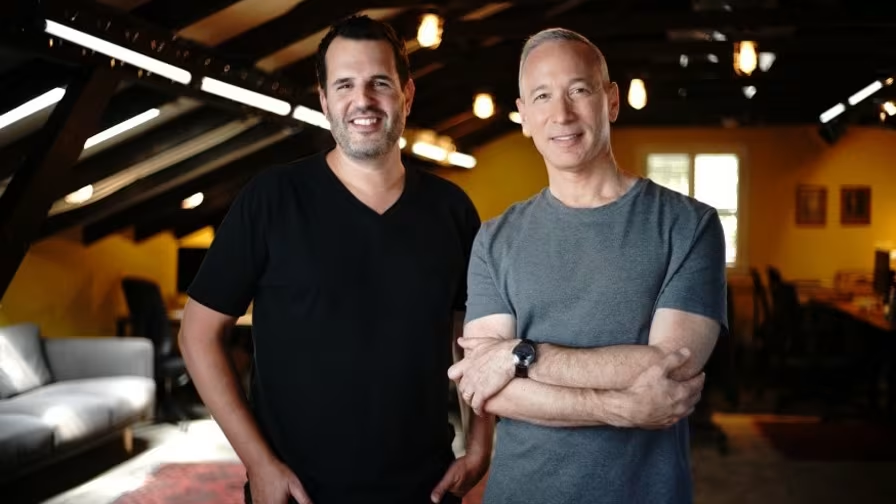
Think at London Business School
How Lemonade tore up the insurance rulebook
File a claim with this Real Innovation Awards winner and in most cases you’ll find a chatbot handles it quickly and efficiently
By Emma Broomfield
Find out morePlease enter a keyword and click the arrow to search the site
Or explore one of the areas below
How one company is teaching the world to speak new languages

During a year when foreign travel has been largely off the cards, the number of people learning a new language has grown exponentially. Duolingo – the world’s highest-grossing language-learning app, with more than 500 million downloads – is testament to this. Duolingo’s Europe director Colin Watkins explains: “In the weeks after the first lockdown, we had 67% growth worldwide and 30 million new users. All these organisations were scrabbling around, trying to find new ways of learning online, particularly schools. We had the Women’s Institute saying, ‘Learn a language.’ People who were binge-watching Game of Thrones said, ‘Let’s learn High Valyrian’ [yes, you can learn that with Duolingo]. We wanted to do something positive with our time, and the app was popping up in newsletters all over the place.
“Business-wise, it was very interesting. We do a lot of modelling and forecasting, we’re very data-driven, but this threw everything out of the window. I was looking around going, ‘What should we focus on now?’ The pandemic presented some very unique challenges.”
"Timing always plays a crucial factor in a company’s success. In Duolingo’s case, launching coincided with the growth of mobile-phone apps"
New challenges are something the Pittsburgh-based company can handle. Since its launch in 2012, it has constantly adapted to market changes while staying true to its core mission: giving everyone the chance to learn a language for free.
Duolingo’s story can be traced back to 1996, when 18-year-old Guatemalan Luis von Ahn – now chief executive – needed to sit an English-language exam. “Luis had been accepted by Duke University in North Carolina to study computer science,” says Watkins. “But, as an international student, he had to pass an English-language exam. To take the exam he had to fly, at great expense, to El Salvador, where a civil war was going on. He passed the exam and began university.”
Roll on a few years and Luis had become a professor, invented Captcha and Recaptcha (the illegible squiggles to prove you’re not a robot) and sold two companies to Google. He was a multimillionaire by his early 30s. “Luis realised, compared to most Guatemalans, he had been in a privileged position where his family could afford to send him to a private language school and pay for that flight to El Salvador. He wanted anyone to be able to gain the economic advantages that come with being at least partially bilingual. He knew that knowledge of English in a non-English-speaking country can double your income potential,” Watkins points out.
In 2011 Luis and co-founder Severin Hacker came up with the idea for Duolingo.
While Luis and Severin were trying out different business models, their operating principle was always “learners first” – a mantra that continues to guide their choices. Watkins says the two best decisions they made were:
1) Giving the product away free (“this allowed them to scale rapidly and get access to unprecedented amounts of data on how people learn, so they could keep creating the best product”)
2) Making learning fun (“their gamification methods and bite-sized lessons, which can be taken in five-minute bursts, are key to getting people to stick with it”).
Today, the product offers 99 courses in 39 languages. Monetisation comes in three ways: from adverts used on the free standard app; via an ad-free premium version; and from a $49 test that allows users to take university language entrance exams digitally.
Timing always plays a crucial factor in a company’s success. In Duolingo’s case, launching coincided with the growth of mobile-phone apps. “Luis and Severin say the reason they began to get really big was because they had a brilliant mobile product,” says Watkins. “They rode the zeitgeist for that. They were App of the Year for Apple in 2013, which was the time of growth of apps in the App Store. Nobody else was doing it at the time.”
They also found that by using AI, Duolingo can adapt the course for every individual. “The product isn’t textbook-based, and we use AI in the background to change the course. So, if you’re finding it hard, we’ll make it easier to keep you motivated. If you find it too easy, we’ll make it harder. That’s very much how we achieve efficacy.”
Inevitably, there have been failures along the way. “We had the Tinycards app, where users could share flashcard decks to help with memorisation skills. People loved that, but it wasn’t doing what we needed it to do, so we binned it. It was a difficult decision, but we move on and work on new plans.”
Today, more people are learning a language for fun rather than for function and are often influenced by cultural trends. “We have tens of thousands of people under 24 learning Korean,” says Watkins. “That’s because of K-pop – it’s down to the bands BTS and Blackpink touring here. And those people are sticking to it.”
Then there’s TV. “I love it when someone tells me they’re learning French with [Netflix drama] Lupin and that they can understand the native subtitles.”
Access also plays a huge role. “Luis tells a great story,” says Watkins. “In the same week he found out that Bill Gates was learning French on Duolingo, he heard that thousands of refugees were learning Swedish in Sweden. He said, ‘I didn’t think you could have a product that could be used at the same time by one of the richest men on Earth and by someone who had just come out of a war zone trying to settle into a new country.’”
For a country not known for its enthusiasm for tackling new languages, the UK’s figures soared by 132% after the pandemic – almost double the worldwide average. Watkins, who is learning Spanish and German, believes this is down to a cultural shift. “We used to feel other countries could speak English better than we could speak their language. We felt embarrassed, so didn’t even try. Now we’ve got over that hump, so when we go abroad, we at least try to order food in their language. We’ve also found that lots of people are learning a language when they return home, as they wish they could have spoken it while they were there.”
Mental wellbeing and cognitive ability can also be improved by language-learning. “The Alzheimer’s Society gets in touch with me from time to time, telling me about a new study that says learning a language delays the onset of dementia. Now, across the board, brain-training is the second-biggest motivation in the UK.”
The facts speak for themselves. Duolingo has over 300 million learners worldwide. It is valued at $2.4 billion. It is the most downloaded education app in the history of the App Store. It has offices in Pittsburgh, Seattle, New York and Beijing. What next? “Continue to grow, innovate and improve our courses,” says Watkins. “Make all our courses better from different languages. Prioritising English, but getting a really good Japanese-to-Chinese course, an amazing Korean-to-French course... Focus on our efficacy, make our teaching infinitely better.
“We believe if the learner has the best experience, they’ll use us more, enjoy it more, stay motivated, come back and recommend us to their friends. And it grows and on it goes.” Duolingo, last valued at $2.4 billion plans to go public.

Think at London Business School
File a claim with this Real Innovation Awards winner and in most cases you’ll find a chatbot handles it quickly and efficiently
By Emma Broomfield
Find out more
Think at London Business School
Crisis spurs innovation. Discover the innovators who have created lifechanging solutions at the worst of times
By Julian Birkinshaw
Find out more
Think at London Business School
Tomilola Adejana, co-founder of Bankly, explains how the fintech startup is transforming life for millions of Nigerians
By Sophie Haydock
Find out more
Think at London Business School
File a claim with this Real Innovation Awards winner and in most cases you’ll find a chatbot handles it quickly and efficiently
By Emma Broomfield
Find out more
Think at London Business School
Crisis spurs innovation. Discover the innovators who have created lifechanging solutions at the worst of times
By Julian Birkinshaw
Find out more
Think at London Business School
Tomilola Adejana, co-founder of Bankly, explains how the fintech startup is transforming life for millions of Nigerians
By Sophie Haydock
Find out more